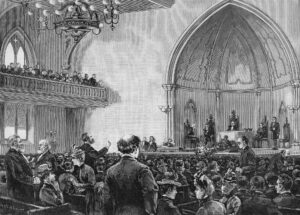It has now been about six months since we celebrated the 500th anniversary of the Protestant Reformation. The balloons and streamers have all succumbed to gravity and found their way quietly to the floor but we need to be sure that this commemoration amounts to more than an increasing heap of slacktivism, self-congratulation, and slogan-tossing.
This article is focused on refining our understanding of the principle of sola scriptura (scripture alone). We usually frame this in terms of authority – Protestants have Scripture as their only authority while Roman Catholics recognize both Scripture and tradition as authoritative – but we would do well to see this first as a question of the location of God’s voice. Authority is what sola scriptura ends up being about but it begins with location: where is God’s voice heard? Is it in scripture alone or in both scripture and tradition together? We will look at two benefits of thinking about sola scriptura in this way.
The Roman Catholic Position
The first advantage of facing the question of the location of God’s voice is that this allows for a more accurate representation of the position of the Roman Catholic Church. We will gain about as much from a debate in which we fail to let the other side speak for itself as we will from ranting against an echo. As is clear from the writings of the Reformers, the Roman Catholic tradition is a valuable voice from which we have a great deal to learn. It will be harder for us to listen well if we begin by mischaracterizing what they are saying.
What follows is two paragraphs from the most recent edition of the Catechism of the Catholic Church.[1] Listen carefully for the reason they give for listening to scripture and tradition together, side by side as equals.
‘Sacred Tradition and Sacred Scripture, then, are bound closely together and communicate one with the other. For both of them, flowing out from the same divine well-spring, come together in some fashion to form one thing and move towards the same goal.’ Each of them makes present and fruitful in the Church the mystery of Christ, who promised to remain with his own ‘always, to the close of the age.’
As a result the Church, to whom the transmission and interpretation of Revelation is entrusted, ‘does not derive her certainty about all revealed truths from the holy Scriptures alone. Both Scripture and Tradition must be accepted and honored with equal sentiments of devotion and reverence.’
For the Roman Catholic church, certainty about revealed truths comes from scripture and tradition because both are “flowing out from the same divine well-spring.” Tradition and scripture are both held up as authoritative because they believe God is speaking in both places. We will want to say that this position logically leads to granting the words of man an equal authority with the words of God but location is the key to the discussion. The issue is not first that they believe the words of church tradition and the words of God are equal. Rather, they believe that God’s voice is located in tradition and scripture together.
A Dangerous Tendency
The second benefit of framing sola scriptura by speaking of the place from which God speaks is that it helps to uncover a slippery threat to this principle. Both Protestants and Roman Catholics would agree that we need to stand on what God has said. As just noted, the difference between us is where we believe the voice of God is located. Protestants believe that it is only in scripture that God speaks to us with authority and clarity while Roman Catholics believe that God speaks to us in scripture and tradition bound together. While they will listen to tradition and scripture alongside one another, we listen to tradition in the service of listening to scripture. We work to give careful attention to our historical and contemporary community of faith so that we might pay better attention to our God who speaks in our Bible.
If part of the core of our faith is the claim that the voice of God is distinctively heard in the Bible then we will give a great deal of energy and attention to scripture. We will delight in the law of the Lord and meditate on it day and night. Like a tree we will bury roots as deep as we can into this soil to find living water (Ps 1). We will join the Psalmist in saying “Blessed are you, O LORD; teach me your statues” and then we will take the time needed to listen well (Ps 119:12, ESV). We will elevate the testimony of scripture, as the place where God speaks, above all other voices.
But one of the ways we tend to live lower than this profession is that we ask for our Bibles to function as little more than yearbooks. We pick up our Bible and read only until it reminds us of something we already know or already heard. It can be something we have come to from our own study but it is often something we have heard from someone else, a favorite author or speaker especially. There is no problem with learning well from good teachers but we are in real trouble if all our Bible reading does is remind us of what we heard someone else say. A yearbook is meant just to take us back and while scripture does a lot of reminding and remembering, it is meant to open our ears to the voice of God so that we will be led forward.
In a sense, this is stick-a-toothpick-in-the-cake issue. How do we know when we are done? If all that our Bible does is bring us back to the cluster of things we already know then we are shortchanging ourselves and grossly shrinking the role that scripture is meant to play. It is a horrendous inversion of what I profess to believe if all my Bible does is prompt me to think about a book I once read, regardless of how good that other book was! Do I read until my memory is prodded or until my heart is pierced (Heb 4:12)? Do I study until I can quote an expert or until I have heard the voice of God (Ps 119:12)?
Ask Your Bible to do More
Usually with sola scriptura we are concerned about something like tradition doing too much but we need to be equally concerned about our Bible doing too little. If scripture is the only place where God speaks authoritatively, then where should our most careful attention be paid? A friend of mine, with whom I share a love of books and reading, spoke to me about the way the Bible can be neglected, distressingly familiar beside all the books on our shelves which seem to hold hidden treasures. Another way I see this in myself is when I am reading a book and quickly skim the quoted passages of scripture because I already ‘know’ them.
We need to look harder into and listen more closely to our Bible. We need to fight against the lazy satisfaction of being reminded of what we already know by asking more questions. Is this really what this passage says? How does this push against what I think I already know? What does it seem like this portion of scripture was meant to accomplish among God’s people? It can be helpful to ask: if I only had this passage, what could I say about God, about myself and humanity, about the gospel and the life that flow from it? We should not stop there but we would do well to start there.
Living and Active
In the end, sola scriptura speaks to the issue of authority but it begins with the question of location. If we believe that our God speaks to us in scripture alone, then we will cling to his testimonies and run in the way of his commandments (Psa 119:31-32). Charles Spurgeon insisted that it “is God’s Word rather than man’s comment on God’s Word which is made mighty with souls.”[2]
Your soul needs the life-giving words of God and you know where you can hear them. A Bible that only reminds us of something else we heard is a far cry from the living and active word which lays the depths of our hearts bare. If we believe that God speaks in a unique way in scripture then we must not veil the prophetic power of His word by screening it behind what we ‘already know.’ Keep the books, subscribe to the podcast, and listen well to your pastors and teachers, but do so in service of being a sheep reaching to hear the voice of the Good Shepherd (John 10). It is a bizarre contradiction for us to stand under the banner of sola scriptura while treating scripture as little more than a sanctified yearbook.
[1] Catechism of the Catholic Church, 2nd ed. (New York: Doubleday, 1995), §80 and §82.
[2] Charles Haddon Spurgeon, The Treasury of David, vol. 1 (Virginia: MacDonald, n.d.), 272. He was commenting here on Psalm 19:7: “The law of the LORD is perfect, reviving the soul….”























